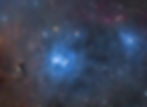van den Bergh 1 - Space Amoeba
November 1, 2024
Use mouse wheel to zoom, drag to pan, and buttons for other options
About 1,600 light years away in Cassiopeia, you can find the first entry, vdB 1, in Sidney van den Bergh’s catalogue of reflection nebulas. Just below the very bright variable star Caph (β Cassiopeiae), vdB spreads out over a diameter of five light years.
The larger field shows a large amount of dark gas and dust as well as HII emission material. But near vdB 1 itself, there’s a lot going on. Let’s take a closer look:

Just left of the middle of this crop, we see vdB 1. On the right side is what appears to be a second blue reflection nebula. As best I can tell, it’s not associated with vdB 1. And I can find no reference to it in SIMBAD or any of the other official astronomical databases. The coordinates of the central star are 00:09:23.715 +58:39:56.89. If anyone knows what this is, please let me know.
On the left side of the image, something very interesting is going on. Let’s take an even closer look.

Here we see some not-yet-fully mature stars carving out their existence in the universe. On the bottom is a star labeled V633 Cass, a Herbig Ae/Be star, or young stellar object (YSO). It’s associated with Herbig-Haro objects HH 161 and HH 164, which may be nascent companion stars being born. They are carving rings below the star.
Herbig Ae/Be stars are young stars that are not yet on the main sequence. They may yet be surrounded by gas and dust as well as a circumstellar disk where planets may some day form. Herbig-Haro objects are protostars that are accumulating mass via an accretion disk. But as that material swirls in, other material is ejected along jets perpendicular to the accretion disk. This could well be the source of the rings we see below V633 Cass.
Above V633 Cass in the crop, V376 Cass, also a Herbig Ae/Be star, makes an appearance. It is associated with HH 162. Its outflow is headed to the upper right in a funnel shape.
To paraphrase Melisandre, ‘The night is dark and full of wonders.’



Finder Chart

Click to expand
Total integration: 50h 58m
Integration per filter:
- Lum/Clear: 12h 39m (253 × 180")
- R: 8h 48m (176 × 180")
- G: 8h 45m (175 × 180")
- B: 8h 36m (172 × 180")
- Hα: 12h 10m (146 × 300")
Coordinates: 0h 10m 26s · +58° 46′ 14″
Image Capture
Location:
Deep Sky West









